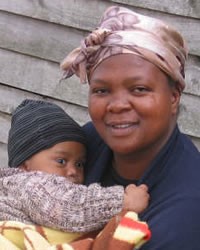Xhosa is a Bantu language in the Nguni family of languages. It is one of the click clack languages of southern Africa. They have lived in the East Cape area since the 600s. Their ancestors are the Nguni people. The first Xhosa kingdom was in the 1400s when Nguni clans were united under one chiefdom.
Starting in 1652, Dutch and later British settlers encroached on Xhosa land pushing them further east. They tried to fight off both the Europeans and African tribes that were escaping the powerful Zulu Empire, but their efforts were often weakened by famine. Europeans killed off Xhosa cattle, weakening this large tribe even further.
Some Xhosas developed a pattern of working for the Europeans and developing trade unions. Their involvement with trade unions have given them more political clout to this day. However, Europeans forced most Xhosas to live in “homelands”, which were not dismantled until 1994.
A large number of Xhosas still live in homelands where unemployment is high. Women and children often live there and depend on their husbands, who live apart from them and work in mines, etc.
In modern South Africa, the Xhosas have made their experience with trade unions work for them, and today they hold much political power.
Christianity is dominant in Xhosa life, especially among the women and children. They often walk long distances to church and spend all of Saturday night in prayer and worship. Many denominations are represented, and women wear different uniforms depending on their denomination.
Ancestor worship taints their form of Christianity. Underneath the Christian exterior, there is faith in ancestral spirits. Most Xhosas, even church leaders, believe they must keep their ancestral spirits satisfied. One of the things they do is wear beads around their wrists, which is a way to be tied in with their ancestors.
Commonly, Xhosa families are separated. Men take on low paying jobs while their wives and children are far away. Consequently, there is much prostitution, leading to the spread of sexually transmitted diseases.
There is a problem with sexual abuse. A high percentage of Xhosa women have endured rape. Most efforts to evangelize and disciple is aimed at women and children, when the men need it the most. If someone discipled men and taught them how to be loving husbands and fathers, they could glorify the Lord rather than remaining marginally Christian.
Though the Xhosa have many who are well educated, there is still a great need for full literacy among them. This is especially true in rural areas.
Pray for more efforts to disciple Xhosa men in the ways of Christ.
Pray that Xhosa men will tire of the way things are and surrender their lives to the King of kings.
Pray there soon will be a Holy Spirit led revival that will bless all of South Africa.
Scripture Prayers for the Xhosa in South Africa.
https://en.wikipedia.org/wiki/Xhosa_people
http://www.orvillejenkins.com/profiles/xhosa.html#:~:text=Xhosa%20is%20a%20Bantu%20language%20in%20the%20Nguni%20family%20of
https://www.sahistory.org.za/archive/house-phalo-history-xhosa-people-days-th
| Profile Source: Joshua Project |











